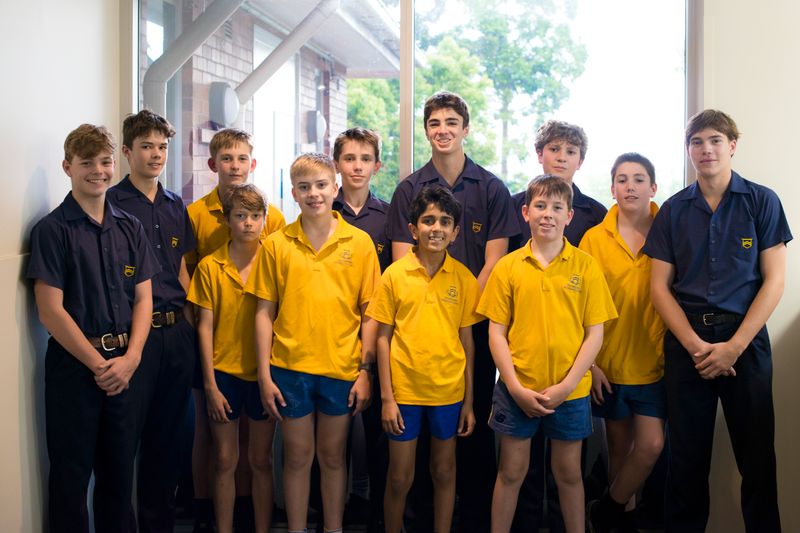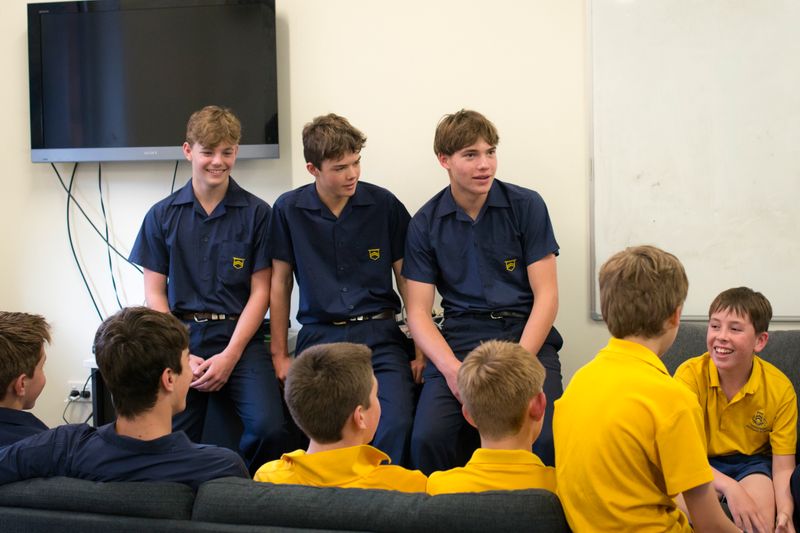“In doing so, the Year 10 boys act as coaches to guide the boys through these problems, providing advice from personal experience via the embedded leadership curriculum. The intention of this curriculum is to provide a shared language for emotional expression, thus providing Year 7 boarders with the vocabulary to express themselves and to model vulnerability and reciprocal patterns of self-disclosure.”Mr Henry White, Head of Corfe House

A residency designed to foster a positive sense of belonging.
As a boarding master of adolescent boys, my role fundamentally concerns pastoral wellbeing and character development to support a successful academic journey. A positive sense of belonging — where boarders feel safe, supported and heard — is fundamental to an effective boarding environment. As such, I felt there was a distinct connection between the International Boys’ Schools Coalition’s (IBSC) theme for the 2024–25 Action Research Cohort, “Boys and Belonging” and what I believe is best practice boarding in Corfe House.
Through 10 years of experience in boys’ boarding houses, I’ve observed a reluctance among boys to voice their concerns and express themselves emotionally, thus allowing themselves to be vulnerable amongst their peers and immediate support network. This reluctance significantly impacts their ability and willingness to disclose problems and seek help. Consequently, it affects their sense of belonging within the boarding environment and has broader implications for their holistic development. This issue is particularly pertinent for boarders in Corfe House, who are in the early stages of identity development.

I’ve noticed that even boys with emotional maturity or the tools to communicate their concerns are not necessarily inclined to do so. This observation has led me to consider the connection between a boarder’s sense of trust and their willingness to display vulnerability, likely influenced by cultural norms related to masculine identity rather than just their ability to articulate themselves. I believe that fostering a heightened sense of belonging within a boarding environment may effectively counter these cultural norms.
When considering this context amongst the larger body of research literature, it is frightening to consider the bigger picture at play — that being the damning statistics surrounding Australian men and issues pertaining to men’s mental health and suicide. I’d like to think these concerning trends can be countered by positive cultural shifts that promote male vulnerability and allow men to speak out and seek support without fear of shame or being perceived as weak.
As such, the purpose of my research project is to provide my Corfe House boarders, who embark upon their broader boarding journey at a relatively impressionable age, with the necessary skillset, confidence and vernacular to effectively communicate issues presenting as barriers to their pastoral wellbeing and sense of belonging. In doing so, they are encouraged and empowered to be vulnerable rather than repressing their feelings — a common trait we see with adolescent boys, often influenced by cultural factors and a lack of words to articulate their emotions.

To enable this project, we initiated the official Corfe House Year 10 Service and Leadership Residency Program at the commencement of Term 2 in 2024 — a residency for Year 10 boarders with aspirations for leadership and a willingness to serve. So far, we’ve been incredibly impressed by the newfound sense of calm within Corfe House and the positive mentoring that has developed organically. Within this residency, we have embedded a Leadership and Character Education Program for Year 10 residents comprising explicit teaching in leadership, coaching, peer support and lessons in positive masculinity. Through this program and weekly mentoring and coaching sessions where the Year 10 residents embed these skills and knowledge within their own “Mentor Session”, we have sought to educate and broaden student perspectives that align with the TGS purpose — “Educating boys and developing their good character for life.”
During the mentoring sessions, the Year 10s share previous challenging experiences from their own time in Year 7 Corfe House boarding (thus modelling vulnerability), allowing an informal platform for Year 7 boys to reciprocate and share any current challenges they are facing.
Furthermore, as a means of measuring Corfe House boarders’ increased willingness to be vulnerable, Year 6 and 7 Corfe House boarders undertake a daily wellbeing survey each evening designed to gauge boarders’ daily emotional wellbeing and their willingness to disclose their problems, thus providing a platform to demonstrate their vulnerability.
While a boarding leadership residency is not a revolutionary concept, the embedded Leadership and Character Education Program and new methods to measure boarder pastoral wellbeing offer a valuable point of difference for our School. In addition, Year 10 residents become participants in the wellbeing and pastoral care of younger boarders — a novel experience that fosters personal relationships and good character development — rather than simply being a presence. Moreover, by empowering Year 10 residents with leadership capabilities and opportunities to exercise these skills, they also develop their own leadership identity and sense of belonging through ownership within the larger boarding program.
Latest Blog
Helping Boys Build Stronger Identities at TGS
Social media influencers, hyper‑masculine stereotypes and the pressure to “perform” academically, socially and emotionally can distort a young man’s sense of self long before he has the tools to understand what he’s feeling. Toowoomba Grammar School (TGS) has recognised this challenge and responded with intention. Through a bespoke Pastoral Care model and a powerful partnership with Tomorrow Man and other leading professionals, the School is reshaping how boys understand identity, connection…
Cambodia Cultural and Service Tour
Across twelve days with RAW Impact, the group moved through moments of cultural immersion, physical work, reflection and genuine connection with local communities. Their words capture the impact more powerfully than any adult could. Phnom Penh: Confronting history to understand the present The tour began in Phnom Penh, where the group visited the Killing Fields and S21 before beginning their service work. For many boys, this was the moment they realised the tour would be life changing. As Year…
Old Boy Geoffrey Smith inspires at our Senior School Speech Night
Toowoomba Grammar School’s Senior School Speech Night was marked by a powerful address from Old Boy Geoffrey Smith (2002–06), recently named the 2025 Australian of the Year for Queensland. Geoffrey, co-founder of Australian Spatial Analytics (ASA), has become a national leader in recognising the untapped potential of neurodivergent Australians in the workforce. His organisation provides geo-spatial and engineering services while creating meaningful employment opportunities - with 80 per cent…
Tears at the Gate, Pride at the Finish
Melanie Elms says she regularly sees a group of TGS parents socially, they've become lifelong friends Heartfelt moments bookend the boarding years “It feels very surreal. I'm proud, but it is very surreal.” Those were the words of Mrs Melanie Elms from 'Taringa' near Edgeroi, New South Wales, as she reflected on the moment her youngest son Sam finished his time at Toowoomba Grammar School. An end to walking up to Taylor House returning a boarder to TGS forever and it comes just 12 months after…
The Grammar Boy: TGS Character Cast in Bronze for All Time
Unveiled on Friday, 7 November 2025, this new statue is more than a work of art. It is a symbol of the enduring character that has shaped Toowoomba Grammar School for 150 years. The ceremony began with the ringing of the School House bell, it’s a sound many current students were hearing for the first time but one that may just have stirred memories for some of the Old Boys in attendance. As Headmaster Dr John Kinniburgh remarked in his address, “Today is a special occasion… one I’ve been…
Taking TGS Rugby West: making mates in the Longreach district
Last month, Head of Rugby Lincoln Clapham, TGS Old Boys' Association Vice President, Trent Raymond (1989-93) and two Year 11 boarding students, Luke Burrow (2025 First XV Co-captain) and Archie Smart, travelled 11.5 hours west to Longreach to deliver rugby clinics in partnership with the Longreach School of Distance Education (LSODE) and Western Queensland Rugby Union. Archie and Luke had both been to Longreach before but enjoyed the QANTAS Founders Museum The visit was part of a broader…
The Modified Rugby Program’s Game-Changing Impact
Founded in Brisbane in 2014 by the not-for-profit GingerCloud Foundation Limited, the Modified Rugby Program (MRP) gives neurodiverse young people the chance to play a sport and their families the opportunity to be part of a sporting community. It also allows coaches and player mentors the very privileged role of helping these young people have what many consider a normal experience - the joy of being part of a team. For Year 12 boarder Will Brown, it is a cause that is close to his heart.…
When School days become years of Mateship, Growth and Unforgettable Memories
Yesterday’s Awards Assembly for our senior cohort saw lashings of pride, reflection and a time for parents and caregivers to savour the very nearness of graduation after years of growth and grit. As the boys prepare for their final external exams and the much-anticipated Formal, this gathering marked the beginning of their final chapter at Toowoomba Grammar School. The assembly featured a moving reel that traced their growth from wide-eyed Junior School boys to confident young men. There were…
Japan: A Journey of Discovery, Culture and Connection
For 30 students and four staff members from Toowoomba Grammar School, the recent Japan Cultural and Technology Tour was a vibrant tapestry of tradition, innovation and transformation. From the bustling streets of Tokyo to the serene temples of Kyoto, this immersive experience offered students a unique lens through which to view the world. The Kinkaku-ji (Golden Pavilion)